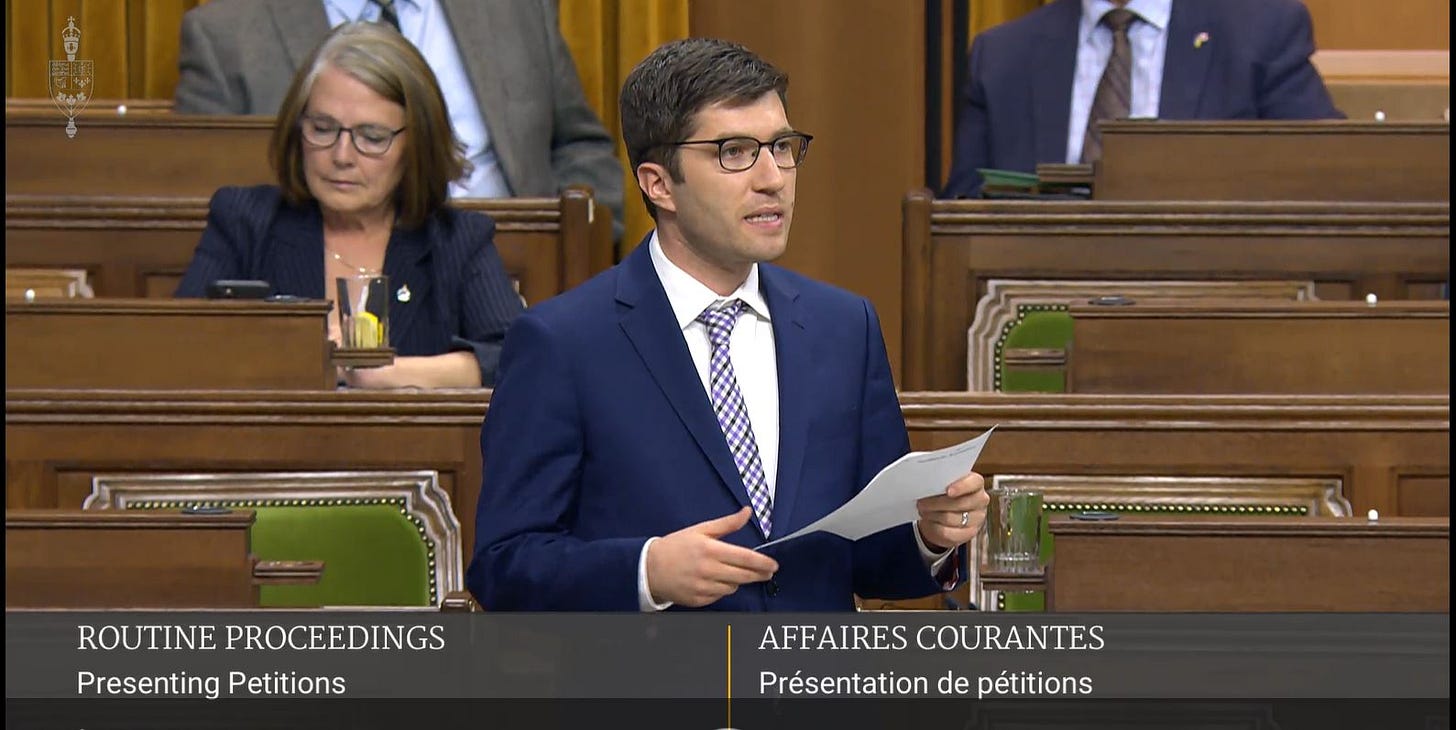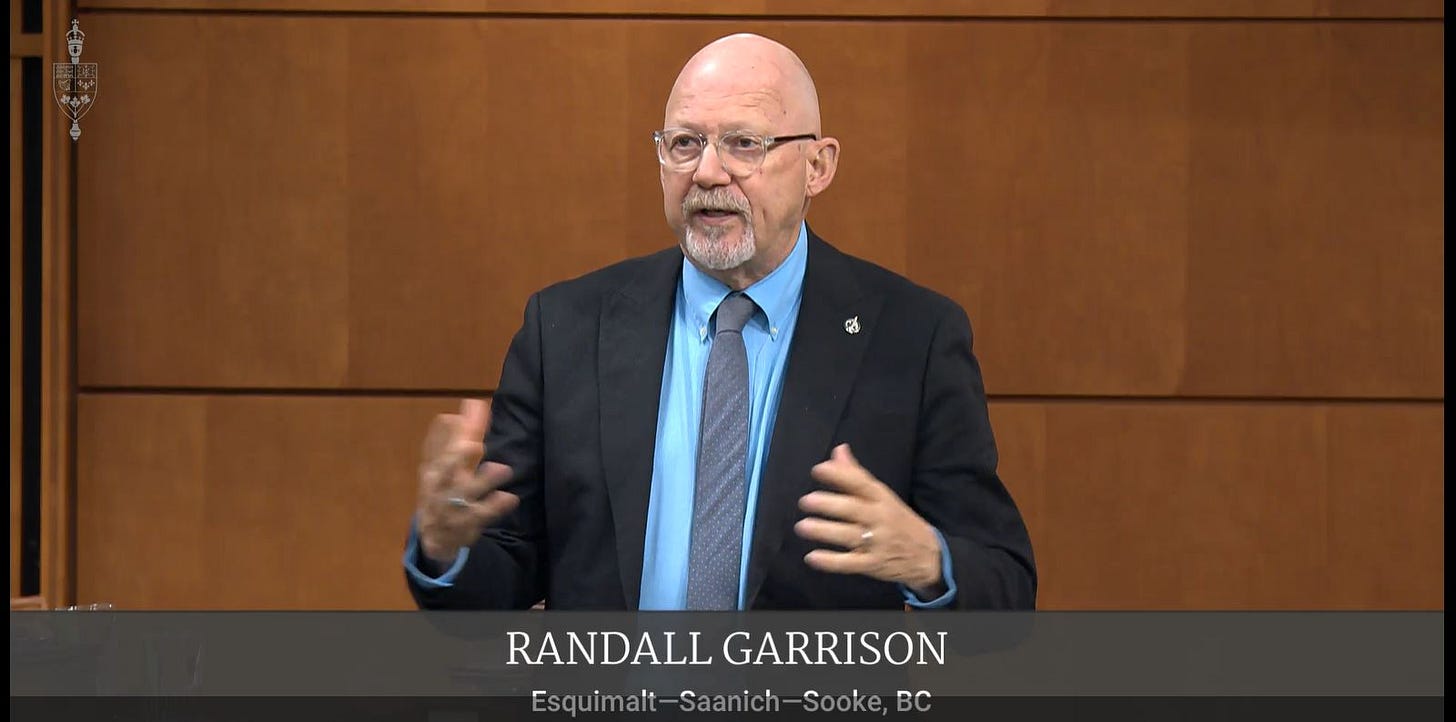Hi, fellow China watchers. In today’s edition, we are going to zoom in on not multiple but one middle power: Canada. With the Middle East being quieter on Fridays, we decided to experiment with a special edition at the end of the week where we take a closer look at what is being said about China at the Canadian Parliament.
2 China-related debates in Parliament this week:
The detention of Huseyin Celil, a Canadian citizen and a Uyghur human rights activist
Human rights violations happening inside the Tibet Autonomous Region
2 questions that we couldn’t find answers for.
1 bill is back on the agenda as expected and might actually get passed.
We’re starting with the opposition’s remarks on the detention of Huseyin Celil.
Who asked what:
Conservative MP Garnett Genuis submitted a petition Wednesday advocating for the release of the Uyghur-Canadian activist Huseyin Celil in China.
“And third, that the government appoint a special envoy to work on securing Mr. Huseyin Celil's release. The petitioners also want the government to seek the assistance of the Biden administration and other allies around the world in obtaining Mr. Celil's release, again similar to the practice used in the case of the two Michaels.”
Newly posted Canadian envoy to Beijing Jennifer May also echoed the importance of rallying international support in a recent interview with the Star.
She said on Thursday that diplomatic pressure could help a detainee’s case if countries banded together. She said she’s not going to avoid criticism of China and will “keep pushing and pushing” for Celil’s release.
Celil was arrested during a family trip to Uzbekistan in 2006 where he was handed over to the Chinese authorities and later convicted on terrorism charges.
The following is the debate over Canada’s response to the human rights violations against Tibetans.
Who asked what:
Randall Garrison asked what Canada has been doing regarding the human rights violations happening inside the Tibet Autonomous Region (TAR) and Tibetan areas in China such as Sichuan, Qinghai, Yunnan, and Gansu.
“Since 2018, how many requests has the Canadian government made for permission for Canadian officials and diplomats to visit the TAR, and how many were approved and denied,” said Garrison on Tuesday.
He also asked other questions including whether Canada has called on China to comply with UN laws and international human rights obligations, such as the International Convention for the Protection of All Persons from Enforced Disappearances and the International Covenant on Civil and Political Rights.
More on Garrison: He has been the MP for Esquimalt–Saanich–Sooke, a federal electoral district in Greater Victoria, British Columbia, since 2011. He serves as the NDP’s Critic for Justice, 2SLGBTQI+ Rights and is the Deputy Critic for National Defence. Garrison won his last election, in 2021, with nearly 43% of the vote.
Here’s the government’s response from the Parliamentary Secretary to the Minister of Foreign Affairs Hon. Robert Oliphant.
Oliphant said Canada is “gravely concerned” about the situation in Tibet, an answer that comes as no surprise to people familiar with the government’s stance on China’s human rights infringements.
“In addition, the Government of Canada urges the Chinese government to provide meaningful and unfettered access for independent observers to the TAR, including UN special procedures.”
He added that the government has continuously called on Beijing both privately and publicly to “respect the rights of Tibetans and to take steps to improve the human rights situation in all Tibetan areas across China.”
Oliphant also cited the most recent visit of a Canadian diplomat to the TAR when former ambassador Dominic Barton visited the region in 2020. The trip was hosted by the Chinese government.
“Canada officially requested access to TAR on a regular basis between 2015 and 2020.”
Oliphant’s response matches the government’s stance from last year and offers nothing new.
We’re still waiting for the government to publish written responses to two more issues in Tibet brought up by Garrison: climate change and trade relations.
Garrison questioned whether the Canadian government has raised concerns regarding the “detrimental effects of climate change and Chinese development policies on Tibet’s fragile ecosystem.”
The NDP MP also asked if Ottawa took human rights violations against Tibetans into consideration during public consultations and bilateral discussions regarding the potential Canada-China Free Trade Agreement.
Canada has always kept its trade policy with China subdued and separate from its open criticism of Beijing’s human rights violations.
We’ll watch closely how the Canadian government responds to the above issues.
A glimpse of history: Pierre Elliott Trudeau was the prime minister to have welcomed Canada’s first Tibetan refugees— they were the first non-European refugees to Canada. There were 228 refugees from the region resettled via Trudeau’s Tibetan Refugee Program in 1971.
So far, the human rights atrocities in Tibet haven’t prompted Justin Trudeau’s government to do the same. Instead, Trudeau has publicly distanced himself from the Dalai Lama since taking office as China became an increasingly formidable world power.
On both Tuesday and Wednesday, a number of CPC members pounded on Bill S-223, a bill to combat forced organ harvesting and trafficking.
From Hon. Ed Fast (CPC member in B.C.):
“The families of the victims of forced organ harvesting and trafficking have now waited almost 15 years for Canada to pass this legislation. It is time to end the delays, and the petitioners are calling on the House and on Parliament to now get this done.”
This bill has passed third reading in the Senate and second reading in the House before the summer recess. It is currently stalled before the Standing Committee on Foreign Affairs.
While none of the speakers mentioned China, this is a bill that has been widely discussed in relation to the Asian superpower. In a recent paper, Canadian attorney Sarah Teich listed the passing of the bill as a way to hold the Chinese Communist Party accountable for its Uyghur persecution.
Previous versions of the bill have received unanimous, bipartisan support. If passed, the law would make it a criminal offence for a person to go abroad and receive an organ taken without consent.
1 in-camera meeting for Canada–People’s Republic of China Relationship Special Committee
According to the meeting minutes, the special committee would invite officials from the Department of Foreign Affairs, Trade and Development, the Department of Citizenship and Immigration and the Department of National Defence, as well as other non-governmental personnel to provide an update on the state of China-Canada relations. This meeting is planned to take place on Tuesday, Oct. 4.
Taiwan was not mentioned in the Parliament since its return last week.
Thank you for reading! Please feel free to share this with other China watchers.
If you’d like to read previous issues of this newsletter, click here.
Your feedback/tips/views are always welcome. Please send your comments to themiddlepower@gmail.com.
Have a good weekend!






